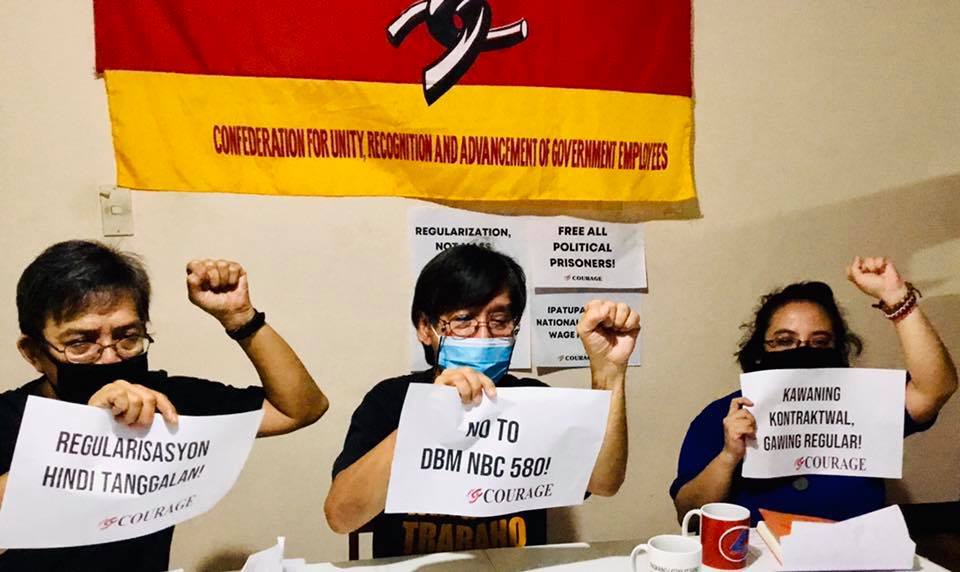Research group IBON said that a real stimulus package that prioritizes emergency cash subsidies, support for small businesses and farmers, and strengthening the health system should be top of lawmakers’ legislative priorities.
This is more critical, the group said, than the bills lifting limits on full foreign ownership in certain economic sectors which the President recently certified as urgent.
IBON said that containing the pandemic, helping the sick, and helping millions of Filipinos badly affected by job losses and falling incomes need immediate attention.
Prioritizing bills to attract foreign investors now is misplaced, and legislators’ attention is much better spent on the country’s more pressing needs, the group said.
Pres. Duterte certified as urgent amendments to the Public Services Act, the Foreign Investments Act, and the Retail Trade Liberalization Act.
The amendments seek to allow full foreign participation in public services such as transportation and communications; lower the number of local hires required of foreign companies in the country; and lower the paid-up capital for foreign enterprises here, respectively.
IBON stressed that the enhanced community quarantine (ECQ) and modified ECQ (MECQ) in the NCR+ only added to the 12.1 million unemployed and underemployed Filipinos already as of February 2021.
The most badly affected are the majority of informal workers especially in retail trade, carinderias, transport and small businesses, and in the hotel and restaurant, transportation and storage, and manufacturing sectors.
The group also said that some 4.9 million poor and low-income families in the Greater Manila area are extremely vulnerable to any income losses from not having any savings to cushion interruptions of their livelihood.
The impact of the ECQ and MECQ will affect these distressed households the most. IBON also said that as much as 189,000 small businesses may have closed nationwide by February, with many likely being in the Greater Manila area.
The continued spread of COVID-19 shows how dismal the government’s testing and tracing efforts to track the virus are over a year since the pandemic hit.
Infected people continue to circulate and too many of those who eventually get sick are not even able to get proper treatment.
IBON blamed this on the government’s tepid response, which falls far short in dealing with the situation.
The Philippines’ fiscal response, equivalent to just 3.8% of gross domestic product (GDP), is among the weakest in Southeast Asia, according to the Asian Development Bank (ADB).
Economic recovery is hampered by the spread of COVID-19 and the lack of fiscal stimulus.
IBON pointed out that the 11.3% increase in government spending last year was even below the average annual increase of 14.3% from 2017-2019.
There is also little aid forthcoming, which the group scored as insensitive. The Php239.3 billion allotment for COVID aid under Bayanihan 1 was reduced to just Php22.8 billion under Bayanihan 2, and even further to Php18.4 billion under the 2021 budget.
Despite tight quarantine levels being sustained beyond two weeks since end-March, the government has not spoken of any addition to the Php23 billion in aid for 22.9 million affected individuals in NCR+.
The Duterte administration’s refusal to spend what’s needed to address the pandemic crisis means that any measure that increases spending on COVID-19 response is urgent and very welcome, IBON said.
In its own recommendation for a Php1.5-trillion expansionary fiscal policy, IBON proposes Php540 billion in emergency cash subsidies for 18 million poor and low-income families (Php10,000 per month for three months); Php101 billion in wage subsidies to micro, small and medium enterprises (MSMEs) to support a Php100/day wage increase for three months; Php40.5 billion for cash-for-work programs; Php220 billion in agricultural support; Php200 billion in financial assistance for MSMEs especially those that are Filipino-owned and domestically-oriented; Php78 billion in financial assistance for informal earners; Php200 billion in COVID-19 health response; and Php113 billion to fund distance education.
The group also cited the Makabayan bloc’s House Bill 7620 or the People’s Strategy for Strengthening Health, Social Protection, Economic, and Local Industrial Development (SHIELD) and House Bill 8628 or the Bayanihan to Arise as One Act (Bayanihan 3) sponsored by House of Representatives Speaker Lord Velasco and Marikina Representative Stella Quimbo.
SHIELD’s Php1.57 trillion budget includes allocations for free and intensified COVID-19 mass testing, treatment, tracing and mass hiring of healthcare and non-healthcare personnel, monthly subsidies for the unemployed, stipends for students, and strategic economic programs.
Bayanihan 3 meanwhile allocates Php420 billion for subsidies to small businesses, businesses in critically-impacted sectors, social amelioration for households, assistance to agriculture producers, and aid for the unemployed.
IBON said that the Duterte administration and lawmakers should give the greatest attention to these proposals which are most deserving of being certified as urgent.
Every additional COVID-19 response measure over the meager amounts allotted by the administration will help the country get out of this crisis faster, stressed the group, whereas bills expanding foreign businesses’ profit-making will not be of any help at all. #

